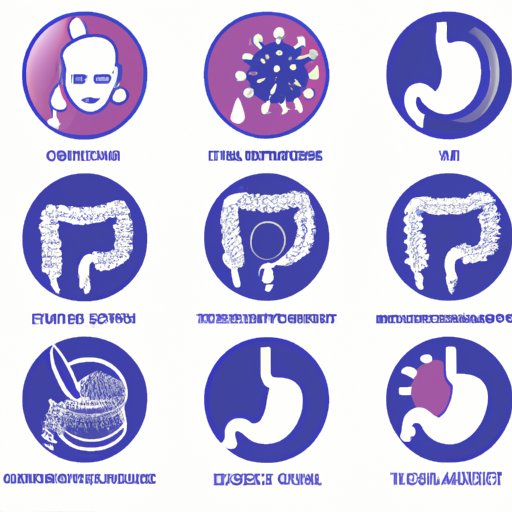
Introduction
Constipation is a common problem that affects people of all ages. It is a condition characterized by infrequent bowel movements, difficulty passing stool, and hard or dry stool. While most people experience constipation from time to time, it can become a chronic issue if left untreated. In some cases, constipation can lead to illness and other complications, affecting the overall health of the individual.
In this article, we will explore the link between constipation and illness. We will discuss the effects of constipation on the digestive system, immune system, and other bodily functions. We will also provide tips and advice on how to alleviate constipation and maintain optimal health.
The Connection Between Constipation and Illness: All You Need to Know
Constipation occurs when the colon absorbs too much water from the food waste, resulting in hard and dry stool. It is often caused by a lack of fiber in the diet, dehydration, and a sedentary lifestyle. However, constipation can also be a side effect of certain medications or medical conditions such as hypothyroidism, irritable bowel syndrome, and Parkinson’s disease.
While constipation itself may not be a serious medical issue, it can lead to other complications and illness. When stool remains in the colon for an extended period of time, harmful toxins can begin to accumulate in the body. This can lead to a range of health problems and affect the overall function of the body.
Constipation can also cause discomfort, bloating, and abdominal pain. If left untreated, it can lead to more serious health complications such as hemorrhoids, anal fissures, and diverticulitis.
The Dangers of Ignoring Constipation: How It Impacts Your Overall Health
Ignoring constipation can lead to a range of health problems and affect the overall function of the body. When stool remains in the colon, it can put pressure on the nearby organs and cause digestive issues such as acid reflux, indigestion, and bloating.
Additionally, constipation can have a negative impact on the cardiovascular system, kidneys, and liver. When harmful toxins accumulate in the body due to constipation, they can enter the bloodstream and affect these organs. This can increase the risk of heart disease, kidney stones, and liver damage.
Warning signs of severe constipation include abdominal pain, blood in stool, and persistent bloating. If you experience any of these symptoms, it is important to seek medical attention immediately.
How Constipation Causes Harmful Toxins to Build Up in Your Body
Constipation can lead to toxic buildup in the body. When stool remains in the colon for an extended period of time, it can become impacted and cause harmful toxins to accumulate in the body. These toxins can include ammonia, histamine, and other harmful substances that can affect the overall function of the body.
Over time, the accumulation of toxins in the body can lead to a range of health problems, including headaches, fatigue, and joint pain. It can also increase the risk of developing chronic conditions such as autoimmune disorders, cancer, and heart disease.
Sick of Feeling Sick? How Constipation May Be the Culprit
Constipation can make a person feel sick and affect their overall quality of life. It can cause nausea, headaches, and general malaise. Additionally, constipation can cause a buildup of gas in the intestine, resulting in abdominal pain and discomfort.
To alleviate constipation and alleviate symptoms, it is important to increase fiber and water intake, and engage in regular exercise. Over-the-counter laxatives and enemas can also be used to alleviate constipation on a short-term basis. In some cases, medication or surgery may be necessary to address the underlying cause of constipation.
The Link Between Constipation and Chronic Fatigue Syndrome
Chronic fatigue syndrome is a condition characterized by persistent fatigue that is not alleviated by rest. While the exact cause of chronic fatigue syndrome is unknown, it is believed to be linked to a range of factors including viral infections, immune system dysfunction, and hormonal imbalances.
Recent research has also shown a connection between constipation and chronic fatigue syndrome. It is believed that constipation can lead to a buildup of toxins in the body, which can contribute to the development of chronic fatigue syndrome. Treating constipation may alleviate the symptoms of chronic fatigue syndrome and improve overall health.
Struggling with Constipation? Here’s How It May Be Affecting Your Immune System
Constipation can affect the immune system and increase the risk of developing illness and disease. The digestive system plays a crucial role in the immune system function, and when it is not functioning properly, the immune system can become compromised.
By improving gut health and addressing constipation, it is possible to reduce the risk of illness and improve overall health. This can be achieved by increasing fiber and water intake, taking probiotics, and engaging in regular exercise.
Conclusion
Constipation can have a significant impact on the overall health and well-being of an individual. It can lead to harmful toxins buildup in the body, affecting the cardiovascular system, kidneys, and liver. Additionally, constipation can cause discomfort and impact daily life. By addressing constipation and maintaining optimal gut health, it is possible to reduce the risk of illness and improve overall health.
Remember to seek medical attention if you experience severe constipation symptoms such as abdominal pain, blood in stool, and persistent bloating. With proper treatment and care, constipation can be alleviated and overall health can be improved.




